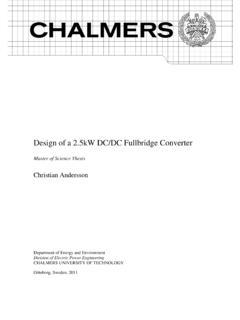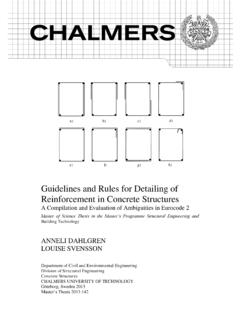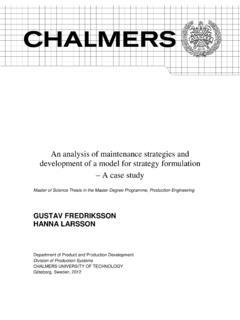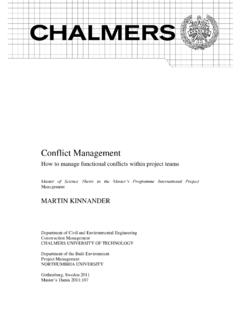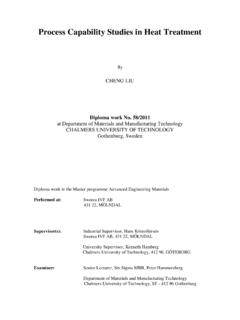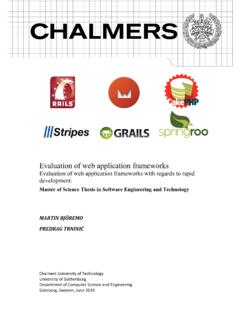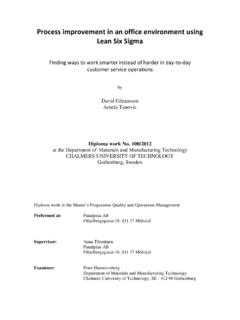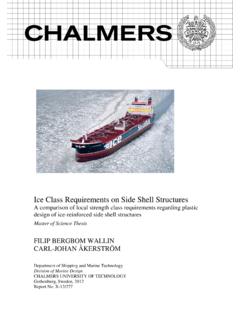Transcription of On turnarounds - Chalmers Publication Library (CPL)
1 On turnarounds A service development investigation from a consultancy firm perspective Master of Science Thesis ERIK JAKUBOWSKI. JULIUS KARLSSON. Supervisor: Erik Karlsson Examiner: Mohammad Shahriari Department of Product and production development Division of Production systems Chalmers UNIVERSITY OF TECHNOLOGY. G teborg, Sweden, 2010. 2. 3. On turnarounds A service development investigation from a consultancy firm perspective Erik S. Jakubowski Julius M. Karlsson Erik S. Jakubowski, Julius M. Karlsson, 2010.
2 Department of Product and production development Chalmers University of Technology SE-412 96 G teborg Sweden Telephone + 46 (0)31-772 1000. G teborg, Sweden, 2010. 4. On turnarounds A service development investigation from a consultancy firm perspective Erik S. Jakubowski Julius M. Karlsson Department of Product and production development Chalmers University of Technology ABSTRACT. The presented problem was an acknowledged business potential for expanding the technical consultancy firm COWI s services towards the process industry cluster on the Swedish west coast.
3 This investigation regards the Swedish turnaround market for oil refineries and petrochemical plants. The current market situation, in terms of competitors, customers, contractors and own competences, has been analyzed with an emphasis on developing technical consultancy services towards the industry. The papers delimitations are among others geographical (the Swedish west coast), and industry related ( turnarounds in other energy industries are not investigated) Three alternatives for future operations are presented and discussed regarding advantages, disadvantages and risks associated to the analyzed market constituents.
4 Methods used include interviews with both refinery managers and COWI personnel, study visits at oil refineries and petrochemical plants, relevant literature studies regarding business risks, competitive advantage and the industry as well as COWIs internal methods for service development. Keywords: turnaround, process industry, consultancy services, risks, competition 5. ACKNOWLEDGEMENTS. First of all we would like to express our sincere gratitude to our devoted supervisor at COWI, Erik Karlsson, for his support, interest, valuable inputs and unconditioned help throughout the entire period of this thesis work.
5 We would also like to direct our gratefulness to our examinator, Mohammad Shahriari, for his guidance and support, especially regarding risks and editorial issues. Lastly, we would like to thank all the engaged personnel within the COWI organization as well as the turnaround and maintenance mangers at the visited refineries and petrochemical plants. Without their inputs it would have been extremely hard to understand the overall concepts of the industry. 6. Contents Introduction .. 9. Project Background.
6 9. Objectives and 10. Delimitations .. 10. Company Introduction .. 11. 2. Method .. 12. 3. Theory .. 13. Competition Theory .. 13. Risk Theory .. 14. 4. Analysis .. 18. Service 18. Introduction to Refinery Operations .. 18. Turnaround Service Description .. 19. Customer Analysis .. 26. Preem .. 27. Shell .. 28. 31. 33. General Customer Summary .. 34. Company Analysis .. 35. Competitor Analysis .. 43. Key Factors .. 44. Competitors .. 44. Competition Mapping Using Porter s Models .. 48. 5. Results.
7 50. Market situation .. 50. Business opportunities .. 52. Alternative 1 .. 55. Alternative 2 .. 56. Alternative 3 .. 57. Associated Risk Categories to Each Alternative .. 59. 6. Conclusions & Recommendations .. 61. Bibliography .. 63. Appendix A .. 64. 7. 8. Introduction Project Background The refining industry is considered to be one of the most complex industries in the world. It is also characterized by very high production volumes and low profit margins. The largest market for oil refining is held by North America and Asia followed by Western Europe.
8 Leading European nations within the refining industry are among others Germany, France and the Netherlands. Major actors in Sweden are; Preem, Shell, Nyn s and within the petrochemical sector Borealis, Perstorp and AkzoNobel. Since the beginning of the 20th century refining operations has, in order to meet the increasing demand of volume and high quality products (higher octane numbers, higher yields, better antiknock characteristics and better feedstocks for further refining ), developed greatly. Modern refining operations involve processes such as fractioning, conversion, treatment, blending and petrochemical processing.
9 Within a refinery there are several thousand components (pipes, heat exchangers, bolts, catalysts, pump sealings, towers etc) that are subjects for different types of maintenance, both preventive and corrective but also scheduled. Demands from authorities (Arbetsmilj verket, PED regulations), insurance companies as well as the nature of the operations forces refineries and petrochemical industries to unconditionally shut down their plant for revision, inspection and scheduled maintenance. This is typically done between every fourth to sixth year.
10 The planning procedures for these types of turnarounds are extensive and are commonly handled by a permanent staff force of the refinery which can be complemented by external consultants. The refinery bears the total responsibility for the turnaround but most work is performed by the hired specialized subcontractors. The competence, experience and manpower for the maintenance work such as tube bundle extraction and cleaning, bolt tensioning, catalyst regeneration and mobile machining to mention some, are often limited to a few companies in Europe.
